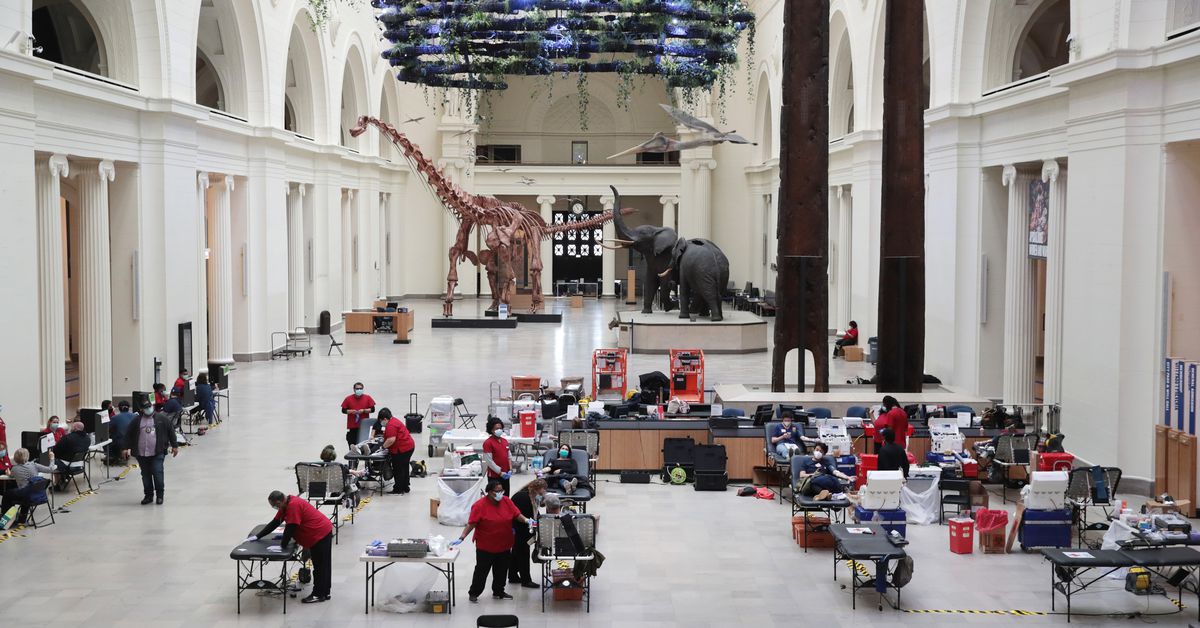
The American Red Cross is testing all donated blood for novel coronavirus antibodies and will use that information to learn more about the spread of COVID-19. They’ll also check back in with donors to find out how long their antibodies last.
If someone has antibodies to the novel coronavirus, it’s a sign that they were, at one point, infected with the virus. While the tests on the market now aren’t perfect, many people are still interested in getting them — including people who thought they had COVID-19, but weren’t able to get tested when they were sick.
One goal of the antibody testing initiative is to encourage more people to donate blood, says Susan Stramer, vice president of scientific affairs at the Red Cross. Stay-at-home orders meant fewer people than usual donated blood over the past few months, and supplies have been running low. The organization has seen about an 150 percent increase in the number of donation appointments since the antibody testing started on June 15th.
When someone donates blood to the Red Cross, they consent to allow their blood samples to be used in research studies. Thousands of people all over the country donate blood each month, which gives the organization a huge pool of blood samples to analyze. By testing all of those samples for novel coronavirus antibodies, the organization will also be able to get a sense of how widespread the virus is.
“We collect 40% of the nation’s blood supply, so we have an easy picture to answer questions around how many people are antibody positive,” Stramer says. So far, with two weeks of data, around 1.2 percent of blood donors have novel coronavirus antibodies.
The Red Cross will reach out to donors who have antibodies and ask them if they’re interested in participating in an additional follow-up study to test how their antibody levels may change over time. These antibodies probably help protect people against getting sick from the virus again, but a lot more research still needs to be done. Researchers still don’t have a good sense of how long antibodies against this virus actually stick around in the body. Some preliminary data suggests novel coronavirus antibodies might only linger for a few months, especially in people who didn’t have symptoms when they were infected.
The study will check in once a month to retest participants’ antibody levels. “We hope to enroll as many people as possible, but I think if we get over 30 percent, we would consider that a success,” Stramer says.
The Red Cross is also participating in a nationwide antibody study, with support from the Centers for Disease Control and Prevention. That study will include multiple blood donation organizations and will check the percentage of the population with novel coronavirus antibodies this fall and again in 2021. “It’s certainly the largest serosurvey I’ve ever been involved with,” Michael Busch, who’s helping lead the efforts as director of the Vitalant Research Institute, told Science. Each of those surveys will include 50,000 blood samples.
The projects are similar but different in scope. “Ours is really a deep dive into the details of our donors and the antibody duration, whereas the CDC program will look at changes over time,” Stramer says.
Blood donation centers have taken advantage of the thousands of samples at their disposal for scientific research for decades. Studies started through the National Heart, Lung, and Blood Institute began studying donated blood in 1989 over concerns about the impact of HIV on blood transfusion safety. Since then, donated blood has helped scientists understand more about diseases like Zika and West Nile virus.
Donated blood won’t give us a perfect snapshot of a population. Some groups are also excluded from donating blood entirely. Men who’ve had sex with another man in the past three months are ineligible, which effectively excludes non-abstinent gay men from donation. The Red Cross is also advertising their antibody tests, so people who were sick might be more likely to volunteer as blood donors — which could skew the data they’re collecting and make it more heavily weighted toward people who have antibodies. The organization is surveying donors to ask why they decided to donate, though, so they’ll have that information to accompany the study.
People also have to be entirely healthy in order to donate blood, and because COVID-19 can linger, there could be a time lag between when people are sick and when they’d be counted in these types of studies.
It’s still valuable to understand how many people who are currently healthy have novel coronavirus antibodies, Stramer says. “It really represents those individuals who may not know they were infected, or who were infected and are now symptom-free.”
